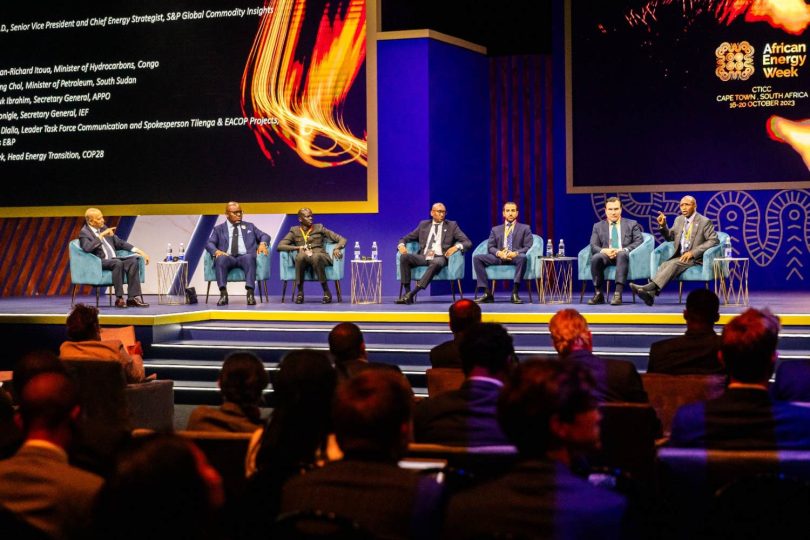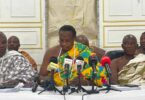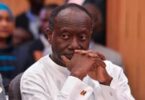
Source: African Energy Week
The African Energy Week (AEW) 2023 conference closing panel discussion – Turning Words into Action: Advancing African Priorities in the Just Energy Transition at COP28 – brought the week’s dialogue and deals to a close, with featured Ministerial speakers promoting the need to turn the discussion of a just energy transition in Africa into an actionable plan.
Serving as a prelude to discussions at the 28th Conference of the Parties (COP 28) later this year, the closing panel underscored the role AEW 2023 plays in advancing the energy transition while serving as a platform to address the unique challenges faced by African nations in ensuring energy security, poverty reduction and industrialization.
While the need to reduce carbon emissions and transition to cleaner energy solutions becomes more pressing, Africa continues to face energy security challenges. Undeveloped resources, an overreliance on imported petroleum and inadequate investment has seen over 600 million people living without access to electricity while over 900 million lack access to clean cooking solutions in 2023.
South Sudan’s Minister of Petroleum Puot Kang Chol stated that, “All we request for is to have reliable, affordable and accessible energy sources: no matter where it comes from.”
At a time when Africa faces the worst impacts of climate change worldwide, innovative solutions are needed to ensure the transition is both just and inclusive. Minister Chol added that, “We need a just, fair and equitable energy transition. One that takes into account our national development goals and prioritizes humanity across the continent.”
Cheick Omar Diallo, Leader Task Force Communication and Spokesperson Tilenga & EACOP Projects, TotalEnergies E&P, added that Africa is only responsible for 3% of global greenhouse gas emissions, and that, “by 2050, it will be no more than 4%. Africa is not responsible for the climate crisis, but Africa is paying the price of the climate crisis.”
COP28 represents an ideal platform for African leaders to engage with global counterparts on the priorities of the continent. Abdulla Malek, Head: Energy Transition at COP28, remarked that, “The objective of the entire COP is to preserve human prosperity, and to avoid the catastrophic impact of climate change so that we can prosper. Our COP28 message resonates with what we have been hearing at this conference. We need to focus on how we accelerate the abatement of emissions, not the source of energy.”
Malek emphasized that, “It is about adopting a policy that is pro-climate and pro-growth.”
Bruno Jean-Richard Itoua, Minister of Hydrocarbons of the Republic of Congo, shared that for Africa, what is different going into this COP is that the continent has a unified voice, and that “Ministers, Heads of State, international and national oil companies are all saying the same thing,” and that is the need to address energy poverty.
However, Minister Itoua added that this is the 28th edition of COP, and that, “A lot of talking has been done but nothing is being done. So many commitments have been agreed upon but those who are responsible and accountable, those that agree they should put money [into renewables], are not doing anything. We hope to see a common view as to what kind of world we want to see tomorrow. We need money for energy efficiency, to save forests and for renewables energy. We need money put into oil production.”
African countries have long-stated that there needs to be a just and inclusive energy transition, one that takes into account Africa’s priorities. Joseph McMonigle, Secretary General of the International Energy Fund, explained that, “There is a disconnect between the developed world and the developing world, particularly Africa. We need to recognize that the priorities here are much different. We need a multidimensional approach. There should be different pathways to providing energy security and economic development and pursuing a transition.”
Dr. Farouk Ibrahim, Secretary General of the African Petroleum Producers Organization, echoed these remarks. He said, “A defining moment for us in Africa is going to be at COP. Success at COP28 is not going to be defined by how much the industrialized and developed countries of the north say they are going to give us and help us with the energy transition.”
Dr. Ibrahim drew attention to the central role technology will play in defining Africa’s energy transition. Rather than abandon the resources that will drive economic growth, Dr. Ibrahim believe that, “We should use technology and remove 500 mega tons [of emissions], so you enable the countries of the south to use the type of fuels (oil and gas) to develop and get to where the developed world is today.”
The AEW 2023 closing panel discussion laid the foundation for high-level discussions set to be held at COP28. Organized by the African Energy Chamber, #AEW2023 takes place this week in Cape Town under a mandate to make energy poverty history by 2030. Keep following www.aecweek.com for more exciting information and updates about Africa’s premier energy event.
Source: www.aecweek.com







